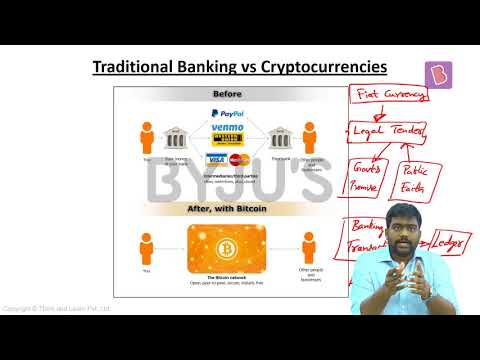Bitcoin is a cryptocurrency developed by an unknown person or a group of unknown persons using the name Satoshi Nakamoto. It was first used in 2009 after being released as an open-source software.
The bitcoin record uses Blockchain technology. Learn about Draft National Strategy on Blockchain in the linked article.
This article will further elaborate upon the concept of Bitcoin within the context of the IAS Exam.
| Kickstart your UPSC preparation now and complement it with the links given below: |
What is Cryptocurrency?
Before going into detail about Bitcoin, it is imperative to understand what is a cryptocurrency. A cryptocurrency is a digital asset that functions as a medium of exchange wherein individual coin ownership records are stored in a ledger existing in a form of a computerized database using strong cryptography to secure transaction records.
Cryptocurrencies typically use decentralized control as opposed to centralized digital currency and central banking systems.
Get detailed UPSC notes on Cryptocurrency at the linked article and questions based on the same may be asked in the upcoming Civil Services Exam.
What is Bitcoin?
- Bitcoin is the maiden implementation of a concept known as “cryptocurrency”. This concept was first described by Wei Dai in the year 1998 on the cypherpunks mailing list wherein he proposed the idea of a new form of money that uses cryptography to control its creation and transactions, rather than with a central authority.
- Satoshi Nakamoto, about whom nothing much is known, was the first person to give Bitcoin specifications and also provide proof of the concept, which he did in 2009. He provided these in a cryptography mailing list. In 2010, Satoshi quit the project. Since then, the community has multiplied with currently many developers working on Bitcoin.

Who controls bitcoin?
- The Bitcoin network is owned by nobody quite like how the email technology is not owned by anyone.
- All Bitcoin users all over the globe control Bitcoin. Developers can improve on the software but they cannot enforce a change in its protocol. This is because all the users have the freedom to opt for the software and version they wish to use.
- For staying compatible with one another, all users have to use software that complies with the same rules.
- Because Bitcoin can work accurately only by a complete consensus among all its users, there is a strong motivation among its users to protect this consensus.
To know more about the History of Banking in India visit the linked article.
Payments by Bitcoin
- Payments by Bitcoin are simpler to make when compared to a credit or debit card transaction. They can also be received with no merchant account.
- Payments can be done from a wallet application (on a smartphone or a computer) by entering the address of the recipient, the payment sum, and press the send button.
- To make it easier to enter a receiver’s address, many wallets can get the address by scanning a QR code or by touching two phones together with NFC technology.
- Bitcoin can be used like any other money form either online or in a brick-and-mortar store.
Bitcoin in India
In March 2021, it was announced by the Government of India that it would be introducing legislation that would penalise an individual found to be in the possession of bitcoin.
The legislation, one of the world’s strictest policies against cryptocurrencies, would criminalise possession, issuance, mining, trading and transferring crypto-assets, said the official, who has direct knowledge of the plan.
The measure is in line with a January government agenda that called for banning private virtual currencies such as bitcoin while building a framework for an official digital currency.
Bitcoin- Download PDF Here
Frequently asked Questions about Bitcoin
How does Bitcoin work?
How is Bitcoin created?
For more information about upcoming Government Exams, visit the linked article. More exam-related preparation materials will be found through the links given below:
UPSC Preparation Links:


Comments